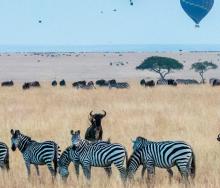Experiential travel is evolving, where the purpose of travel is becoming more meaningful to travellers. Connecting with the locals to understand their traditions; immersing themselves in the culinary and cultural histories; getting involved in conservation initiatives; and making a difference in local projects and initiatives – all these ‘purposes’ are driving the experiential travel trend.
“Experiential travel remains popular, but the trend towards more mindful, conscious travel is growing, as more travellers become aware and conscious of responsible tourism practices and the ability of sustainable travel to transform lives,” says Craig Glatthaar, Business Manager of Wilderness Safaris. “Travellers are becoming more and more aware of the environmental and social impact they have on a destination and they want to know that this impact is a positive one; they want to know that their travel has a purpose, that by travelling to certain destinations they are in fact helping to support communities and contribute towards conservation initiatives.”
Deidre Broodryck-Ward, International Sales Manager of aha Hotels & Lodges, says experiential travel has various faces – culinary, environmental, historic and social. “The main objective is for the traveller to feel changed, inspired, motivated and enlightened. The need to experience something different from your own everyday life truly speaks to the backpacker and the top-end luxury traveller.”
“Clients want to be part of the tour and experience a variety of things as they go,” adds Christiaan Steyn, Marketing Manager of Drifters Adventours, a Division of Tourvest. “They want to be active; they want to meet new and interesting people – not only see them, but have time to interact. The entire journey is an experience from start to finish.”
A number of unique experiences are growing in popularity, says Broodryck-Ward. These include guided walking safaris and tracking experiences; dune boarding in Namibia; ‘voluntourism’ in local communities; dinner experiences in the Bo-Kaap at local homes; Soweto tours by bike; sunrise hikes in the Drakensberg, exploring the winelands by tuk-tuk; and eco-tourism where guests take part in ecological causes.
“I truly believe connecting with the environment and culture remains a big draw card for travellers coming into southern Africa,” continues Broodryck-Ward. “When travelling abroad to market Africa to the world, you are able to feel the excitement from prospective travellers at the idea of walking safaris, experiencing views from horseback or hot-air balloon, storytelling around fires under starry skies, discovering new paths that only few have explored by mountain bike or foot, discovering the life beyond the famous views, and enjoying meals and songs with locals. The traveller ultimately just simply wants to fall in love with the continent.”
“We now choose a different venue on our property for dinner in a three-night cycle, weather permitting,” adds Nic Griffin, CEO of Thornybush Luxury Game Lodge Collection. “This adds to the outdoor experience for guests and is regularly commented on as special and a wonderful surprise.”
Julie Mackenzie, Operations Manager for Italy and ad hoc Groups at Tourvest DMC, says: “On our side we see special-interest tours such as photography and textile touring increasing in demand. There is also the increased interest in solo travel. Special-interest day tours are also on the map, with unique experience like graffiti tours and the likes on the rise.”
Tintswalo Lodges has seen the impact of the global focus-shift on to sustainability translate into experiential travel. “Travellers are showing interest in conservation projects, and getting involved wherever possible. Excursions that involve conservation of wildlife are on the rise, and being able to participate in large-scale conservation efforts, like rhino-notching, for instance, is now in demand,” says Lisa Goosen, CEO of Tintswalo Lodges.
And which type of traveller is the strongest driver of the experiential travel trend? “FITs and smaller groups are embracing experiences; this trend isn’t seen as much with families,” says Masa Yamawaki, Market Manager for Asia, Australia and Nordics at Tourvest DMC.
“A trip to Africa is a once-in-a-lifetime event,” says Broodryck-Ward. “There is definitely a demand to experience more authentic moments as opposed to the standard to-do list. The bucket list traditionally does include safari, Table Mountain and the Garden Route, but there is most definitely curiosity and a willingness to experience the traditional destinations in a manner that will excite and intrigue the traveller, and allow them to share a story that is their own upon return from their visit.”






















